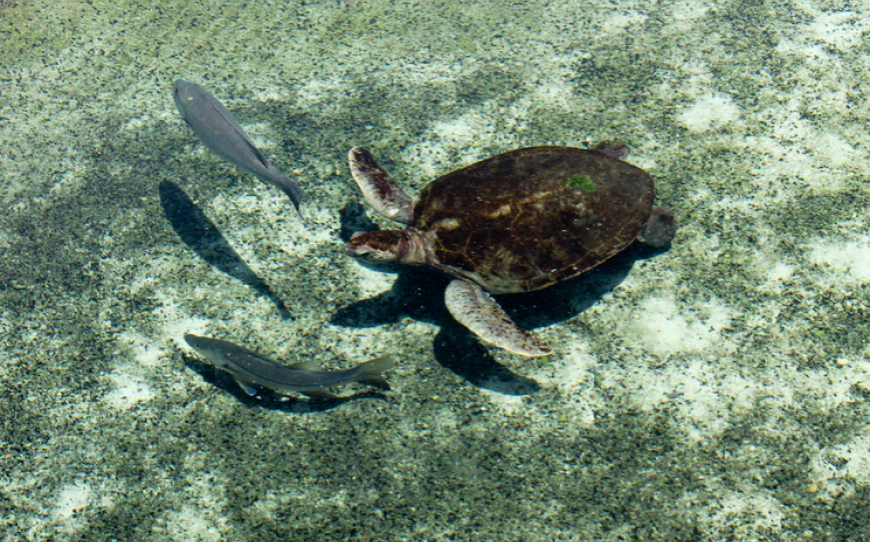This interdisciplinary program combines aspects of biology, chemistry, geology, mathematics, and physics in order to provide a well grounded education in the natural sciences, and it applies a systems approach to identifying and understanding the roles that the oceans play in the functioning of our planet.
Marine Science is designed to train students so that they can obtain jobs related to science and technology in both government and industry, jobs as educators in the natural and environmental sciences, and jobs in the expanding environmental field. Students completing the degree program will also be prepared for further graduate studies in a variety of sciences. Since the Marine Science major employs concepts from many different scientific disciplines, students entering the program should already have had an introductory exposure to geology, biology, physics, chemistry, and mathematics. After completion of the interdisciplinary core of courses, the Marine Science program offers students a great deal of flexibility for individualized program design.
Learning outcomes
Academic Learning Compact
Consistent with its mission and guiding principles, Florida Gulf Coast University is committed to academic excellence and continuous quality improvement, as supported by a sound teaching-learning process. Within this process, students and instructors share responsibility for learning that is a movement from the simple to the complex, the concrete to the abstract, and the dependent to the independent. The Academic Learning Compact (ALC) initiative supports the teaching-learning process by clearly identifying expected core student learning outcomes in the areas of content/discipline knowledge and skills, communication skills, and critical thinking skills; aligning curricula with expectations; and using assessment to guide continuous improvement.
Content/Discipline Knowledge and Skills
Graduates will be able to:
- Understand and explain basic knowledge from the core scientific disciplines (i.e., biology, geology, chemistry, physics, and mathematics) as they relate to marine science.
- Apply scientific knowledge for the resolution of real-world problems.
- Incorporate marine science concepts into an individualized research experience.
Content/discipline knowledge and skills are assessed at the program level through pre- and post-tests, scientific research proposals, senior capstone projects and self-evaluations in the following: ISC 3120 Scientific Processes, OCE 3008C Oceanography and OCB4936 Senior Seminar in Marine Science.
Communication Skills
Graduates will be able to:
- Organize and communicate effectively, using the language and concepts of marine science in a coherent, clear and unified manner.
- Present a research project for marine science students and faculty.
Communication skills are assessed at the program level through scientific research proposals and senior capstone projects in the following: ISC 3120 Scientific Processes and OCB 4936 Senior Seminar in Marine Science.
Critical Thinking Skills
Graduates will be able to:
- Critically evaluate arguments and assumptions and interpret published data relating to marine science.
- Synthesize marine science information and draw reasoned inferences.
- Utilize the scientific process to form hypotheses and design studies for gathering and analyzing data from which to draw scientifically valid conclusions.
Critical thinking skills are assessed at the program level through pre- and post-tests, scientific research proposals and senior capstone projects and self-evaluations in the following: ISC 3120 Scientific Processes, OCE 3008C Oceanography and OCB 4936 Senior Seminar in Marine Science.
Prerequisites
Program Progression and Additional Graduation Requirements
- Attend an orientation session.
- Sign an Advising Agreement document.
In addition to the program requirements, students must:
- Complete a minimum of 120 credits.
- Complete a minimum of 48 of the 120 credits at the upper division (3000 - 4999) level.
- Earn a cumulative GPA of 2.0 for all coursework attempted at FGCU.
- Satisfy the College-Level Skills and foreign language entrance requirements.
- Satisfy the Service Learning requirement. (See https://www.fgcu.edu/studentlife/servicelearning/).
- Satisfy the residency requirement: thirty of the last sixty credits must be completed at FGCU.
- Complete the summer course enrollment requirement.
- Submit an Application for Graduation by the deadline listed in the FGCU Academic Calendar.
- Satisfy Civic Literacy requirement.
ISCED Categories

